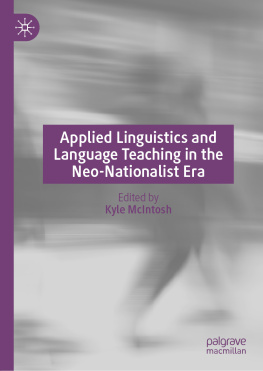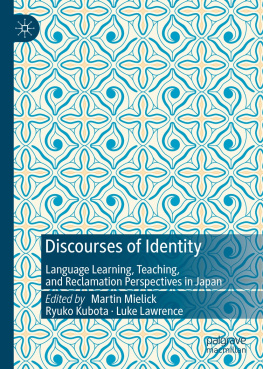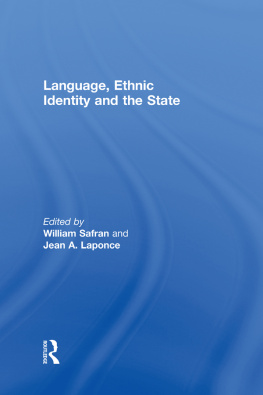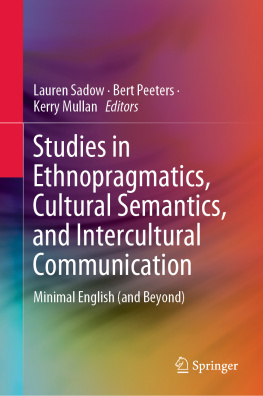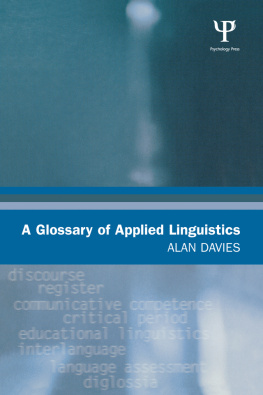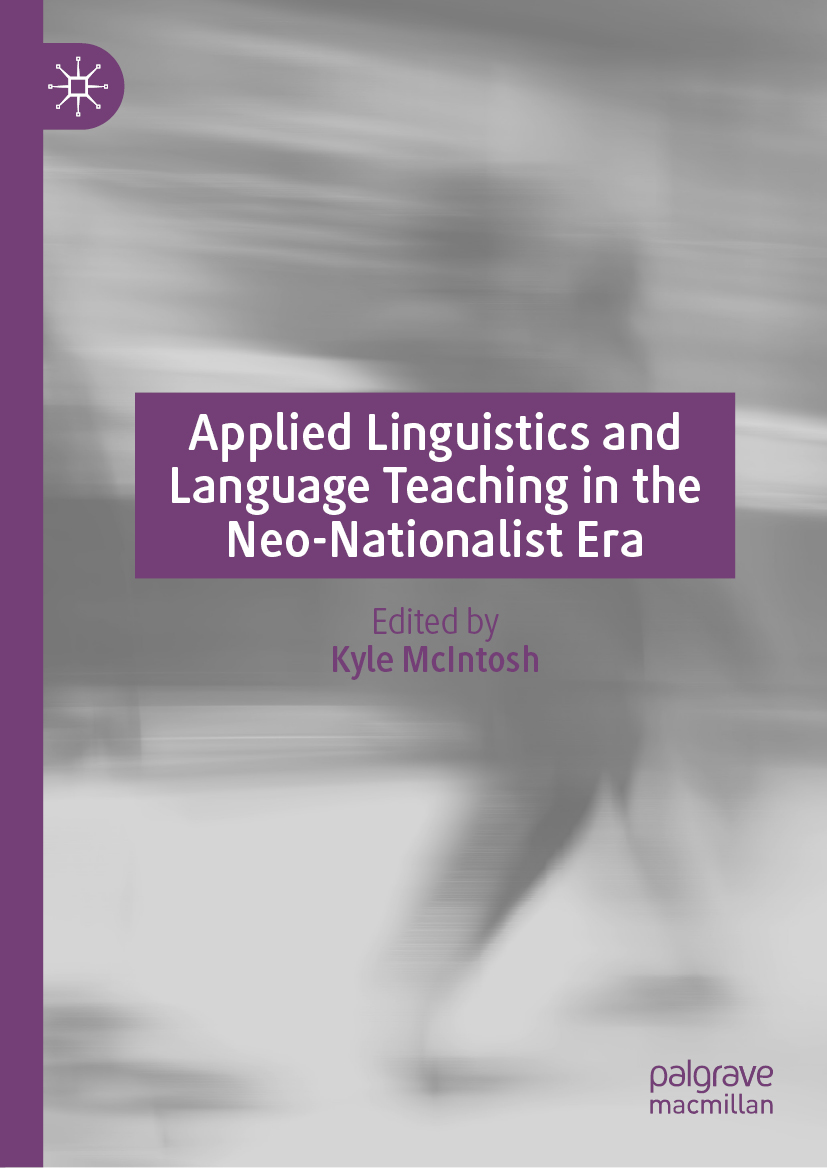Editor
Kyle McIntosh
Department of English and Writing, University of Tampa, Tampa, FL, USA
ISBN 978-3-030-56549-7 e-ISBN 978-3-030-56550-3
https://doi.org/10.1007/978-3-030-56550-3
The Editor(s) (if applicable) and The Author(s), under exclusive licence to Springer Nature Switzerland AG 2020
This work is subject to copyright. All rights are solely and exclusively licensed by the Publisher, whether the whole or part of the material is concerned, specifically the rights of translation, reprinting, reuse of illustrations, recitation, broadcasting, reproduction on microfilms or in any other physical way, and transmission or information storage and retrieval, electronic adaptation, computer software, or by similar or dissimilar methodology now known or hereafter developed.
The use of general descriptive names, registered names, trademarks, service marks, etc. in this publication does not imply, even in the absence of a specific statement, that such names are exempt from the relevant protective laws and regulations and therefore free for general use.
The publisher, the authors and the editors are safe to assume that the advice and information in this book are believed to be true and accurate at the date of publication. Neither the publisher nor the authors or the editors give a warranty, expressed or implied, with respect to the material contained herein or for any errors or omissions that may have been made. The publisher remains neutral with regard to jurisdictional claims in published maps and institutional affiliations.
This Palgrave Macmillan imprint is published by the registered company Springer Nature Switzerland AG
The registered company address is: Gewerbestrasse 11, 6330 Cham, Switzerland
Preface
This edited volume explores how resurgent nationalism across the globe demands a re-examination of many of the theories and practices in applied linguistics and language teaching as political forces seek to limit the movement of people, goods, and services across national borders and, in some cases, enact violence upon those with linguistic and/or ethnic backgrounds that differ from that of the dominant culture. Some questions that this book addresses are: How does rising dissatisfaction with globalization affect public perceptions of second or foreign language learning and learners? How are nationalist ideologies reflected in teaching practices, textbooks, educational policies, and public debates? Could neo-nationalism in some countries be seen as a corrective to the hegemony of the English language and Anglo-American power? How might the fields of applied linguistics and language teaching reaffirm a commitment to multilingualism and multiculturalism in the face of rising nationalism without sounding like apologists for neoliberal globalization? To address these questions and others, the authors in this volume have provided their careful analysis of nationalist discourses and actions in disparate contexts: from Africa to East Asia, Europe to the Middle East, and in North and South America. These authors offer unique historical and cultural perspectives, as well as practical responses, to the fraught political situations with which many language educators and policymakers must now contend.
Following an introduction by Kyle McIntosh in Chapter , which provides background on the rise of neo-nationalism and the dilemmas that this political shift poses for the related fields of applied linguistics and language teaching, the remainder of the volume is divided into two parts: Policies and Practices. Of course, these two facets of our professional lives can never be totally separated, as policy always informs practice, and vice versa. Nevertheless, the chapters included in each section tend to lean more in one direction than the other.
Part I focuses mainly on the ways in which neo-nationalist ideologies influence language-in-education policies in both the political and public realms. As Bryan Meadows notes in Chapter , From the beginning, language has played a central role in the ideology of nationalism (p. 19). To see how this ideology is evolving in the United States today, Meadows examines arguments in support of the so-called English-Only movement. Through critical discourse analysis, he exposes monolingual models of education as a form of border maintenance that attempts to control who belongs in the country and who does not. While the push to make English the U.S.s official language has been stymied at the federal level, it has been more successful on state and local levels. Meadows finds evidence to suggest that the anti-immigration policies of the Trump administration are reinvigorating those who view bilingual education as a threat to their vision of a linguistically, culturally, and ethnically homogenous nation.
While English is the dominant language in the United States , regardless of its official status, and commands a great deal of attentionand criticismworldwide as a lingua franca , it can also be marginalized, especially when saddled with the complex legacies of colonialism, as Bernard Ndzi Ngala reveals in Chapter , Fatima Esseili looks at preemptive measures taken by the government of the United Arab Emirates to prevent social unrest and to promote unity in a country where the expatriate majority has been excluded from many aspects of social and political life. She then contrasts these moves toward a more inclusive, civic nationalism with efforts by the ruling Emirati minority to protect their language and culture from threats posed by globalization and the spread of English. From these chapters, we begin to see just how fraught and fragile the imagined political community ( Anderson , 1983, p. 6) of the nation can be in the face of perceived danger.
In many instances, neo-nationalism stands in opposition to the unfettered movement of people, goods, and services promoted by neoliberalism , but it may also be used to disguise it, as Marlon Valencia and Isabel Tejada Snchez point out in Chapter , Dat Bao and Le-Ha Phan analyze the discussions of Vietnamese nationals and expatriates on social media to better understand how those who take pride in their countrys resistance of western domination may still embrace policies that allow for increased globalization . What they find is a multitude of voices , not always in harmony, coalescing around the idea of belonging to a language and culture that represent the nation, as well as its surrounding region.
While policies continue to be discussed in Part II, just as practices were in Part I, the focus shifts to how neo-nationalism impacts the learning, teaching, and use of foreign and second languages. As in the previous chapter, Ramona Kreis studies social media in Chapter , Paul McPherron and Kyle McIntosh revisit a university in China where they previously taught to examine how recent nationalist policies enacted by the central government in Beijing have altered the teaching practices of their former colleagues and the attitudes of students toward the study of English and other foreign languages . In these two cases, both countries seem to be turning away from greater engagement with the outside world, but top-down edicts from strong central governments could tilt the balance either way.

